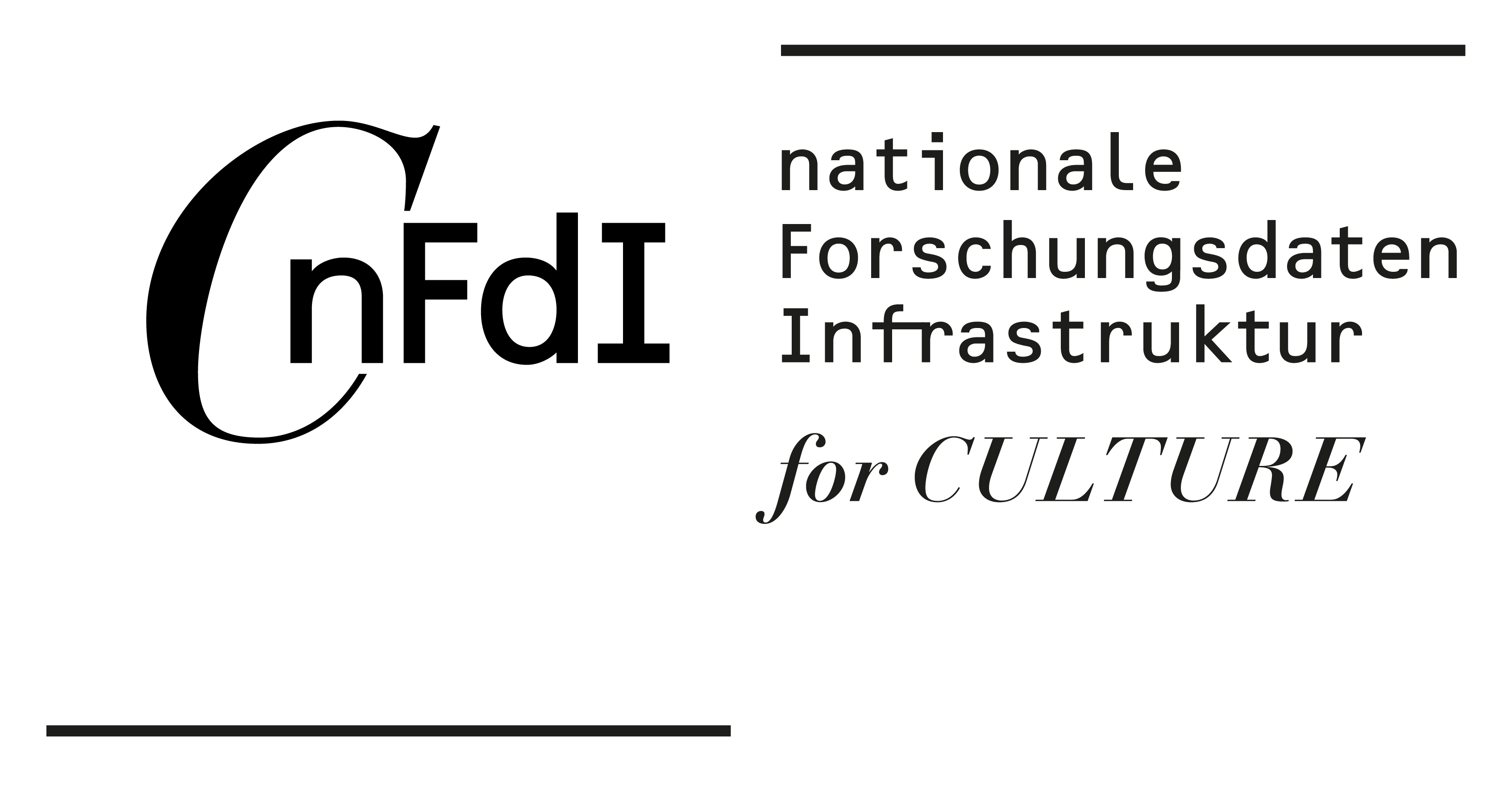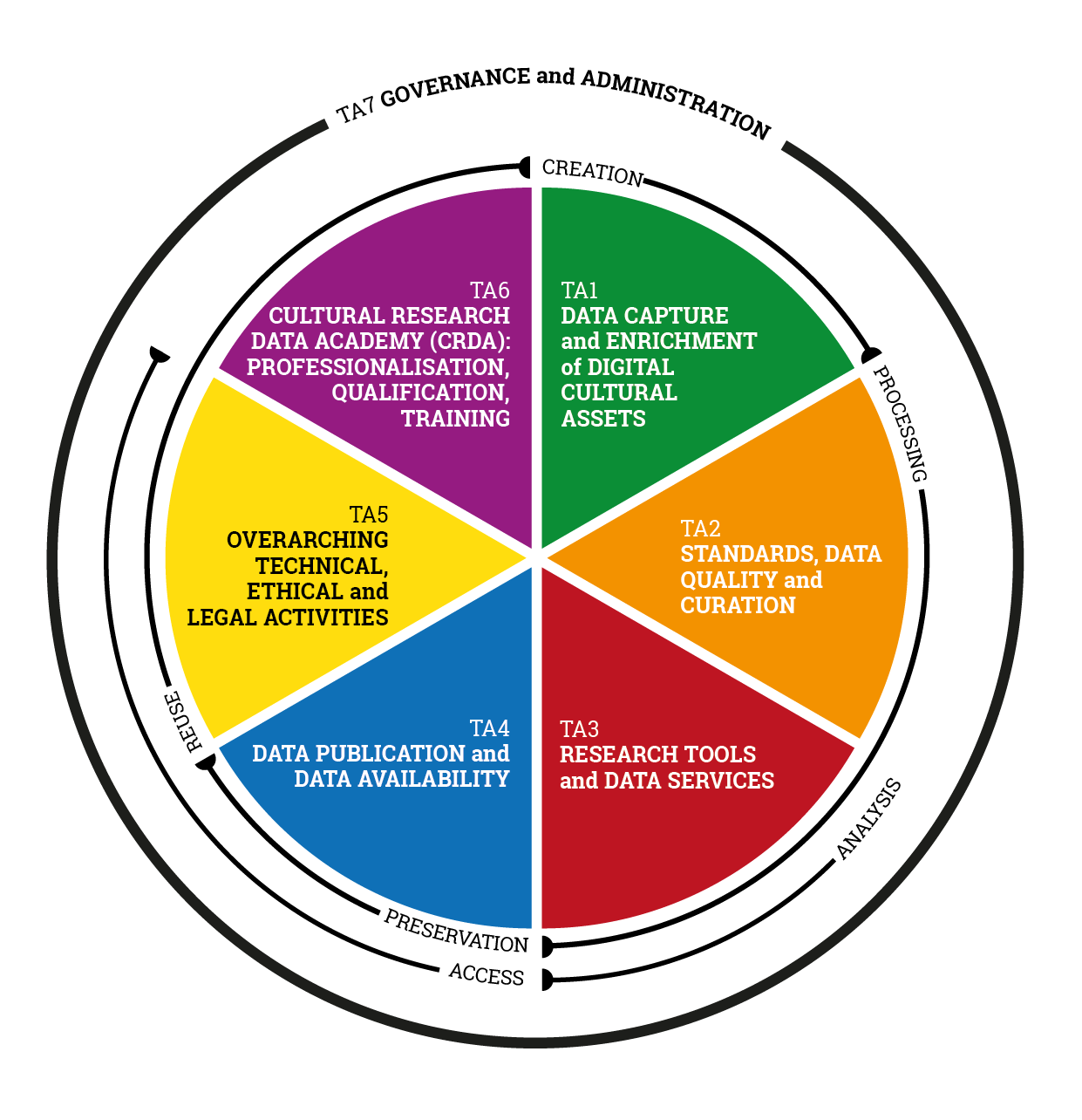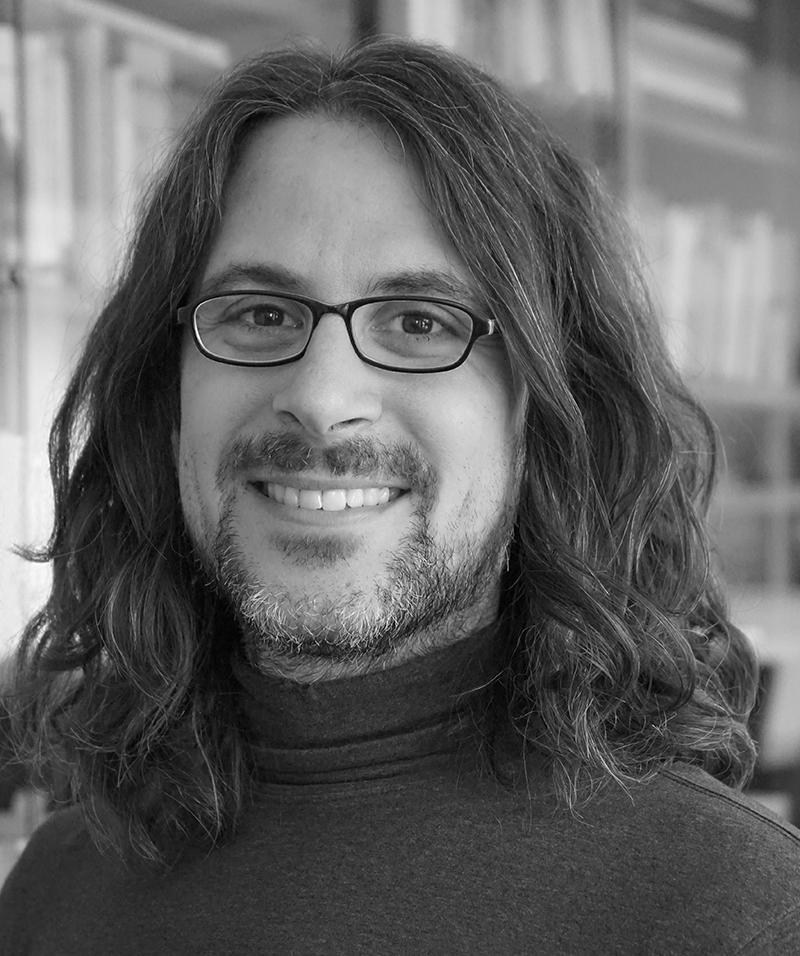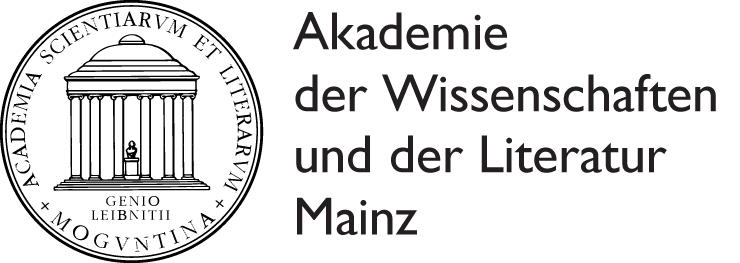
About us
Digital data on material and immaterial cultural heritage are an essential part of everyday life, communication and cultural experience. They are not only of great importance for future generations of scholars, but also form the basis of constant transfer processes between researchers, artists, cultural industries and civil society.The long-term preservation and reliable availability of digital cultural assets in accordance with the FAIR and CARE principles are of fundamental importance for the cultural self-image of individuals, groups and society as a whole. The aim of NFDI4Culture is to establish a demand-oriented infrastructure for research data on tangible and intangible cultural assets within the overall structure of the NFDI.
The research landscape covered by NFDI4Culture, ranging from architecture, art and music to theatre, dance, film and media studies, is characterised by great diversity. It includes university institutes, art and music colleges, academies, galleries, libraries, archives, museums and individual researchers. Science-led research data management requires the active participation of all stakeholders. The consortium therefore provides extensive participation opportunities for users from all disciplines involved, as well as for artists and cultural practitioners from various fields of activity and representatives of civil society. It aims to represent the broad spectrum of different actors in the field of cultural heritage.
Goals
- Aufbau einer bedarfsorientierten Infrastruktur für Forschungsdaten zu materiellen und immateriellen Kulturgütern in der NFDI.
-
Fächerübergreifende Auffindbarkeit und Zugänglichkeit sowie die langfristige Sicherung und kontinuierliche Pflege der Forschungsdaten.
-
Dazu gehören 2D-Digitalisate von Gemälden, Photographien und Zeichnungen ebenso wie digitale 3D-Modelle kulturhistorisch bedeutender Gebäude, Denkmäler oder audiovisuelle Daten von Musik-, Film und Bühnenaufführungen.
-
Kontinuierliche Zusammenarbeit auf Augenhöhe, die bedarfsgerechte Ausrichtung aller Dienste und der regelmäßige Transfer innovativer Forschungsmethoden und -ergebnisse in die Fächer, die NFDI, die Kulturpolitik, die Kulturwirtschaft und die interessierte Zivilgesellschaft.
Task Areas
TA1
Data capture and enrichment of digital cultural assets
Digital representations of tangible and intangible cultural assets provide an essential basis for research in the cultural heritage domain and are more and more present in the day-to-day work of scholars. Thereby, an ever-increasing variety of technologies and data types is being employed, such as 2D, 3D, audio, video, AR/VR, thermography or computer tomography. Our overarching goal is to match the production and continuous enrichment of digital cultural heritage with the demands of researchers, GLAM experts and various other audiences. In close collaboration with the digitisation community, we seek to establish a strong network in order to facilitate a regular exchange between producers and users of digital materials. This will be complemented by open and modular services and tools for the capture and enrichment process of cultural heritage objects.
TA2
Standards, data quality and curation
Our aim is to develop and establish recognised standards and procedures for quality assurance of research data in academic fields that deal with tangible and intangible cultural assets. Data quality not only forms the basis for the reliability of research results, but also for their wider and subsequent use. It ensures that data will be FAIR, i. e. findable, accessible, interoperable and reusable.
TA3
Research tools and data services
Within the context of research on material and immaterial cultural assets, research tools and data services are used to generate, analyse, administer, distribute, publish, and make data available in the long term. Therefore, they are crucial instruments for managing research data sustainably. At the same time, software (i.e. code, documentation) is itself research data and thus the subject of a research data management (RDM) strategy. Researchers, software users, developers and providers can benefit from the services of NFDI4Culture by finding suitable and accessible software for their research. Scholars formulate their needs while participating in the conception and (further) development of appropriate tools and services. Through NFDI4Culture, researchers and institutions dealing with software get support in the development, consolidation and certification of sustainable, interoperable solutions. This allows for a simplified use of relevant research tools and data services in various environments (e.g. cloud, server, individual).
TA4
Data publication and data availability
Within the cultural heritage domain, both repository providers and researches from all disciplines face increasing challenges concerning the publication and long-term preservation of research outputs. The growing complexity calls for an improvement of existing standards and the optimisation of services across the subject areas art history and architecture, musicology, performing arts as well as film and media studies. In close collaboration with the community, we aim to close gaps within the existing infrastructure and to establish sustainable and reliable services.
TA5
Overarching technical, ethical and legal activities
Our main objective is to guarantee a permanent and comprehensive technical infrastructure for the entire consortium which is closely intertwined with the legal and data-ethical aspects. The manifold research data collections of material and immaterial cultural assets will be combined into an overarching knowledge graph. In addition, the tools and services NFDI4Culture consortium offers to the community will be connected and made available via the Culture web portal. At the same time, diverse ethical and legal issues for researchers and institutions that provide, manage or use data are to be taken into account. Material and immaterial cultural assets are subject to specific and sometimes complex legal circumstances which they pass on to the digital data that has been generated from them. We will provide support to the research community in the present while working towards future legislation that will be better tailored to existing needs.
TA6
Cultural Research Data Academy
Being able to use and understand digital data, knowing about advantages and disadvantages as well as challenges and rules are crucial core competencies for scientists today and even more so for generations of researchers ahead. The overall ambition of NFDI4Culture’s Cultural Research Data Academy (CRDA) is to develop and improve subject-specific (“Cultural”) Data and Code Literacy as well as computational thinking and data management skills for the humanities and cultural studies. All these steps will be taken within a framework that complies with the FAIR (Findable, Accessible, Interoperable, Reusable) and CARE (Collective Benefit, Authority of Control, Responsibility, Ethics) principles.


Prof. Torsten Schrade
Speaker of the consortium
(Co-)applicant institutions and (co-)speakers:
- Prof. Dr. Franziska Boehm und Prof. Dr. Harald Sack– FIZ Karlsruhe – Leibniz Institut für Informationsinfrastruktur
- Dr. Christian Bracht und Prof. Dr. Malte Hagener -Philipps-Universität Marburg
- Dr. Barbara Wiermann und Dr. Jens Bove – Sächsische Landesbibliothek – Staats- und Universitätsbibliothek Dresden
- Prof. Dr. Ina Blümel – Technische Informationsbibliothek Hannover
- Dr. Maria Effinger – Universität Heidelberg
- Dipl. Wirt.-Inf. Daniel Röwenstrunk und Prof. Dr. Andreas Münzmay – Universität Paderborn
- Dr. Lisa Dieckmann – Universität zu Köln
- Reinhard Altenhöner – Stiftung Preußischer Kulturbesitz

Academy of Sciences and Literature, Mainz
Applicant istitution
Participating institutions
- Bund Deutscher Architekten e.V.
- Bundesverband TheatersammlungeninDeutschlande.V.
- Gesellschaft für Medienwissenschaften
- Gesellschaft für Musikforschung
- Gesellschaft für Tanzforschung
- Gesellschaft für Theaterwissenschaft
- International Association of Music Libraries and Documentation Centers (IAML), Deutschland
- Rektorenkonferenz der deutschen Kunsthochschulen
- Rektorenkonferenz der deutschen Musikhochschulen
- Deutscher Verband für Kunstgeschichte e. V.
- Verband Digital Humanities im deutschsprachigen Raum
- Vereinigung der Landesdenkmalpfleger
- Arbeitskreis Digitale Kunstgeschichte
- Arbeitsgruppe Digitale Rekonstruktion im DHd Verband
- Arbeitsgemeinschaft kunsthistorischer Bildarchive und Fototheken
- Bach-Archiv Leipzig
- Bayerische Staatsbibliothek München
- FID Musikwissenschaft
- Beethoven-Haus Bonn
- Bernd Alois Zimmermann Gesamtausgabe
- Bibliotheca Hertziana – Max-Planck-Institut für Kunstgeschichte
- Center for World Music
- Cinepoetics (BMBF-Projekt Affektrhetoriken des Audiovisuellen)
- Corpus Vitrearum International, CultLab3D
- Fraunhofer Institut für Graphische Datenverarbeitung
- Data Center of the Humanities
- Deutsche Digitale Bibliothek
- Deutsches Forum für Kunstgeschichte Paris – DFK Paris (Max-Weber-Stiftung)
- Deutsche Nationalbibliothek
- Deutsches Rundfunkarchiv
- Stiftung von ARD und Deutschlandradio
- digiCULT Verbund e.G.
- Ethnologisches Museum – Staatliche Museen zu Berlin
- Europäisches Zentrum für Jüdische Musik
- Fachgruppe Dokumentation, Deutscher Museumsbund
- Deutsches Historisches Institut in Rom
- Friedrich-Alexander-Universität Erlangen-Nürnberg
- documenta und Museum Fridericianum gGmbH – documenta archiv
- Germanisches Nationalmuseum
- Hallische Händelausgabe
- Martin-Luther-Universität
- Herder-Institut für Historische Ostmitteleuropaforschung – Institut der Leibniz Gemeinschaft
- Hochschule Mainz
- University of Applied Sciences
- Institut für Kunstgeschichte und Musikwissenschaft Abteilung Musikwissenschaft
- Institut für Museumsforschung (SPK)
- Institut für Theaterwissenschaft
- Universität Leipzig
- Kulturhistorische Sammlungen der Leibniz Gemeinschaft
- Kunsthistorisches Institut in Florenz
- Max-Planck-Institut für Kunstgeschichte
- Kunsthistorisches Institut, Ludwig-Maximilians-Universität München
- Lehrstuhl für Musikethnologie, (Goethe-Universität Frankfurt)
- Mainzer Zentrum für Digitalität in den Geistes- und Kulturwissenschaften
- Museen der Stadt Köln
- Digital-Initiative “Museen 2022+”
- Museum für Naturkunde Berlin
- Leibniz-Institut für Evolutions- und Biodiversitätsforschung
- Musikinstrumentenmuseum der Universität Leipzig
- Niedersächsische Staats- und Universitätsbibliothek Göttingen
- Rathgen-Forschungslabor, Répertoire International des Sources Musicales Deutschland
- Répertoire International des Sources Musicales International
- Répertoire International des Sources Musicales Schweiz
- Répertoire International d’Iconographie Musicale
- Staatliches Institut für Musikforschung (SPK)
- Staatsbibliothek zu Berlin (SPK)
- Universität Bonn
- Universitätsbibliothek Frankfurt: Fachinformationsdienst Darstellende Kunst
- Universitätsbibliothek Leipzig: Fachinformationsdienst Medien-, Kommunikations- und Filmwissenschaften
- Universität der Künste Berlin
- Zentralinstitut für Kunstgeschichte in München
- Zentrum für digitale Kulturgüter in Museen (ZEDIKUM) Staatliche Museen (SPK)
- Zentrum für Kunst und Medien Karlsruhe
- Zentrum Bundesrepublik Deutschland des Internationalen Theaterinstituts e.V.

Prof. Torsten Schrade
Speaker of the consortium

Academy of Sciences and Literature, Mainz
Applicant institution
(Co-)applicant institutions and (co-)speakers:
- Prof. Dr. Franziska Boehm und Prof. Dr. Harald Sack– FIZ Karlsruhe – Leibniz Institut für Informationsinfrastruktur
- Dr. Christian Bracht und Prof. Dr. Malte Hagener -Philipps-Universität Marburg
- Dr. Barbara Wiermann und Dr. Jens Bove – Sächsische Landesbibliothek – Staats- und Universitätsbibliothek Dresden
- Prof. Dr. Ina Blümel – Technische Informationsbibliothek Hannover
- Dr. Maria Effinger – Universität Heidelberg
- Dipl. Wirt.-Inf. Daniel Röwenstrunk und Prof. Dr. Andreas Münzmay – Universität Paderborn
- Dr. Lisa Dieckmann – Universität zu Köln
- Reinhard Altenhöner – Stiftung Preußischer Kulturbesitz
Participating institutions
- Bund Deutscher Architekten e.V.
- Bundesverband TheatersammlungeninDeutschlande.V.
- Gesellschaft für Medienwissenschaften
- Gesellschaft für Musikforschung
- Gesellschaft für Tanzforschung
- Gesellschaft für Theaterwissenschaft
- International Association of Music Libraries and Documentation Centers (IAML), Deutschland
- Rektorenkonferenz der deutschen Kunsthochschulen
- Rektorenkonferenz der deutschen Musikhochschulen
- Deutscher Verband für Kunstgeschichte e. V.
- Verband Digital Humanities im deutschsprachigen Raum
- Vereinigung der Landesdenkmalpfleger
- Arbeitskreis Digitale Kunstgeschichte
- Arbeitsgruppe Digitale Rekonstruktion im DHd Verband
- Arbeitsgemeinschaft kunsthistorischer Bildarchive und Fototheken
- Bach-Archiv Leipzig
- Bayerische Staatsbibliothek München
- FID Musikwissenschaft
- Beethoven-Haus Bonn
- Bernd Alois Zimmermann Gesamtausgabe
- Bibliotheca Hertziana – Max-Planck-Institut für Kunstgeschichte
- Center for World Music
- Cinepoetics (BMBF-Projekt Affektrhetoriken des Audiovisuellen)
- Corpus Vitrearum International, CultLab3D
- Fraunhofer Institut für Graphische Datenverarbeitung
- Data Center of the Humanities
- Deutsche Digitale Bibliothek
- Deutsches Forum für Kunstgeschichte Paris – DFK Paris (Max-Weber-Stiftung)
- Deutsche Nationalbibliothek
- Deutsches Rundfunkarchiv
- Stiftung von ARD und Deutschlandradio
- digiCULT Verbund e.G.
- Ethnologisches Museum – Staatliche Museen zu Berlin
- Europäisches Zentrum für Jüdische Musik
- Fachgruppe Dokumentation, Deutscher Museumsbund
- Deutsches Historisches Institut in Rom
- Friedrich-Alexander-Universität Erlangen-Nürnberg
- documenta und Museum Fridericianum gGmbH – documenta archiv
- Germanisches Nationalmuseum
- Hallische Händelausgabe
- Martin-Luther-Universität
- Herder-Institut für Historische Ostmitteleuropaforschung – Institut der Leibniz Gemeinschaft
- Hochschule Mainz
- University of Applied Sciences
- Institut für Kunstgeschichte und Musikwissenschaft Abteilung Musikwissenschaft
- Institut für Museumsforschung (SPK)
- Institut für Theaterwissenschaft
- Universität Leipzig
- Kulturhistorische Sammlungen der Leibniz Gemeinschaft
- Kunsthistorisches Institut in Florenz
- Max-Planck-Institut für Kunstgeschichte
- Kunsthistorisches Institut, Ludwig-Maximilians-Universität München
- Lehrstuhl für Musikethnologie, (Goethe-Universität Frankfurt)
- Mainzer Zentrum für Digitalität in den Geistes- und Kulturwissenschaften
- Museen der Stadt Köln
- Digital-Initiative “Museen 2022+”
- Museum für Naturkunde Berlin
- Leibniz-Institut für Evolutions- und Biodiversitätsforschung
- Musikinstrumentenmuseum der Universität Leipzig
- Niedersächsische Staats- und Universitätsbibliothek Göttingen
- Rathgen-Forschungslabor, Répertoire International des Sources Musicales Deutschland
- Répertoire International des Sources Musicales International
- Répertoire International des Sources Musicales Schweiz
- Répertoire International d’Iconographie Musicale
- Staatliches Institut für Musikforschung (SPK)
- Staatsbibliothek zu Berlin (SPK)
- Universität Bonn
- Universitätsbibliothek Frankfurt: Fachinformationsdienst Darstellende Kunst
- Universitätsbibliothek Leipzig: Fachinformationsdienst Medien-, Kommunikations- und Filmwissenschaften
- Universität der Künste Berlin
- Zentralinstitut für Kunstgeschichte in München
- Zentrum für digitale Kulturgüter in Museen (ZEDIKUM) Staatliche Museen (SPK)
- Zentrum für Kunst und Medien Karlsruhe
- Zentrum Bundesrepublik Deutschland des Internationalen Theaterinstituts e.V.